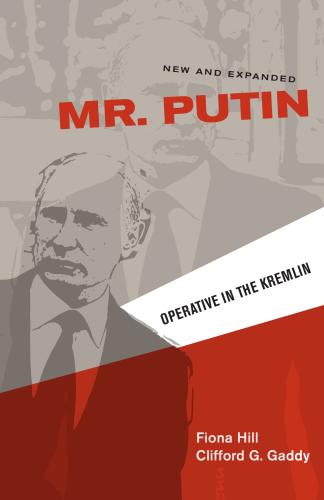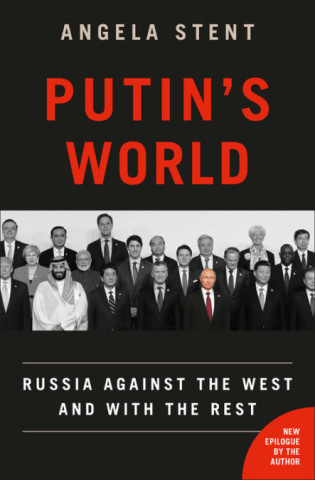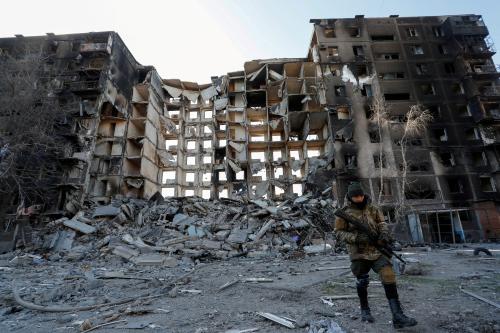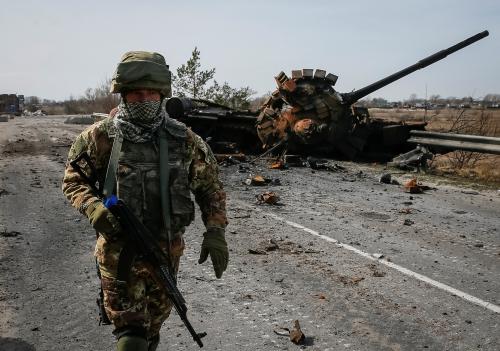All wars come to an end. One side may be conquered, the attacker may give up and withdraw, or the warring parties can negotiate a settlement, argues Steven Pifer. This article was originally published on the Center for International Security and Cooperation.
All wars come to an end. One side may be conquered, the attacker may give up and withdraw, or the warring parties can negotiate a settlement. Whether Russia’s unjustified war on Ukraine gets to a genuine negotiation depends first on whether Vladimir Putin and the Kremlin adjust their demands. Lack of success on the battlefield may give reason to do so, but the Kremlin has yet to show real readiness to engage. Even if Moscow gets serious, the negotiation will prove difficult.
A Failing Offensive?
Russian forces invaded Ukraine on February 24. To the surprise of many in Moscow, Ukrainian armed forces have waged a stubborn, determined and effective defense. Russian officials claim that military operations are proceeding according to plan, but few share that view.
Russia’s armed forces have clearly underperformed. They failed to occupy Kyiv, believed to be their top objective. Kharkiv, Ukraine’s second largest city sited just 20 miles from the Russian border, remains in Ukrainian hands. The Russians continue to struggle to gain Mariupol, which they have subjected to brutal bombardment. Moscow says it has lost 1,351 soldiers killed in action, but NATO officials estimate the true number lies between 7,000 and 15,000.
In what may be implicit acknowledgment of the difficulties the Russian military has encountered, Russian officials have said their main goal now is “the liberation” of Donbas in Ukraine’s east. The Russian ministry of defense claimed to be withdrawing some forces near Kyiv, but U.S. officials questioned whether they intended a withdrawal or planned simply to reposition forces, perhaps to take part in operations in Donbas.
Negotiating Positions on the Table
Moscow earlier in the war advanced maximalist demands: denazification, demilitarization, neutrality, recognition of Crimea as part of Russia, and recognition of the so-called Donetsk and Luhansk “people’s republics” as independent states. On March 29 in Istanbul, Ukrainian negotiators put forward Kyiv’s proposals. On March 30, Kremlin spokesperson Peskov downplayed the proposals, saying they were not “too promising.”
If—still an if question—Moscow decides to engage seriously, tough negotiations would ensue.
One Russian demand is denazification, which seems a code phrase for a change in government in Kyiv, a government headed by a Jewish president. In view of Ukraine’s performance on the battlefield, there is no reason to think President Zelensky or his government would agree.
A second Russian demand is demilitarization. By one account, the Kremlin wants Ukraine to cut its armed forces to no more than 50,000. The Ukrainian government has little incentive to reduce its military, as doing so would leave the country open to a future Russian invasion.
The third demand—neutrality for Ukraine—at first glance appears negotiable. Zelensky has said Kyiv should accept that NATO membership is not on offer. His negotiators have proposed neutral status, no hosting of foreign bases, and no pursuit of nuclear weapons, but they want security guarantees in return, including a commitment to use armed force in Ukraine’s defense.
Would Western countries with meaningful military power commit to a possible future armed conflict with Russia? And would Moscow consent to a settlement with guarantees entailing the possibility of such future intervention?
Moreover, how does the Kremlin define “neutrality?” Two weeks ago, Peskov indicated that Austria and Sweden might offer models for Ukrainian neutrality. Both are European Union members. Would Moscow agree to that possibility for Ukraine? Kyiv has made clear its continued interest in EU membership.
Moscow’s fourth demand is that Kyiv recognize Crimea as part of Russia. In 2014, Russia used military force to seize Crimea and annexed it following a sham referendum. Many Ukrainians likely understand that they lack the leverage to secure the peninsula’s return. However, formally acknowledging that could cause a domestic political backlash. Kyiv has offered to agree not to use force to secure Crimea’s return and to settle the peninsula’s status within 15 years. Russian officials say that Crimea’s status is not on the table.
The final Russian demand is that Kyiv recognize the Donetsk and Luhansk “people’s republics” as independent states. That could also be tough for Kyiv domestically, particularly as Moscow recognized the statelets’ independence in their Ukrainian oblast borders. Prior to February 24, Russian and Russian proxy forces controlled only 35 percent of the Donetsk and Luhansk oblasts. Kyiv has proposed that this question be resolved directly between Zelensky and Putin.
Leave the Decision to Kyiv
Kyiv’s proposals offer a serious bid to end the war. Zelensky clearly wants a halt to the fighting, as more Ukrainians die each day, but he is not prepared to give away the store. Any negotiation will require tough decisions on the settlement terms—decisions that should be made by Zelensky and his government, as any compromises could prove controversial in a country that has united against the Russian aggressor.
U.S. officials believe the West should not press Kyiv to accept any particular outcome but should leave those decisions to the Ukrainians. The White House made that clear on March 29. That is the correct approach for Washington and the West.
However, no real negotiation will be possible unless and until the Kremlin recognizes that it cannot achieve its objectives by force and that it will have to back off of its maximalist demands. If and when matters reach that point, the hard bargaining will begin.
The Brookings Institution is committed to quality, independence, and impact.
We are supported by a diverse array of funders. In line with our values and policies, each Brookings publication represents the sole views of its author(s).










Commentary
Op-edRussia-Ukraine: A negotiated settlement will be difficult
March 31, 2022